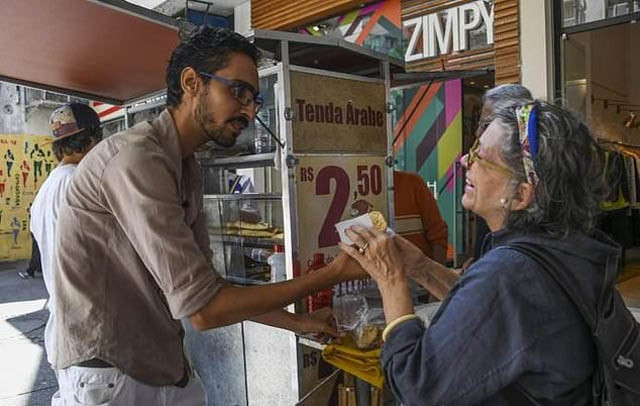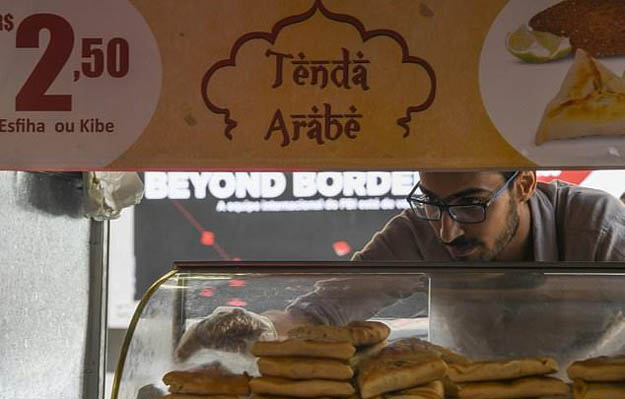After anti-Muslim attack, Brazilians shower victim with love
Egyptian immigrant was attacked three weeks ago in what appeared to be a hate crime

Kenawy is known as "the Syrian refugee" but he is actually an Egyptian immigrant with Syrian roots who obtained a permanent residency card when he married a local woman. PHOTO: AFP
The answer -- a flood of love transforming the humble vendor into a folk hero and, on Thursday, the recipient of a city award -- was a heartwarming no.
But the truth may be a little more complicated.
It all began August 3 when Mohamed Ali Abdelmoatty Kenawy, 33, was manning the cart from which he sells Arab-style meat pies and hummus in the thronging center of Copacabana.
 Egyptian immigrant Mohamed Ali Abdelmoatty Kenawy, who was attacked three weeks ago in what appeared to be a hate crime, works at his food stand in Rio's Copacabana neighborhood. PHOTO: AFP
Egyptian immigrant Mohamed Ali Abdelmoatty Kenawy, who was attacked three weeks ago in what appeared to be a hate crime, works at his food stand in Rio's Copacabana neighborhood. PHOTO: AFPSuddenly a thick-set, bald man carrying two sticks appeared, screaming at Kenawy, who came to Brazil three years ago and has since become universally known as "the Syrian refugee."
Anti-Muslim hate groups nearly triple in US since last year: report
"Get out of my country!" yelled the assailant. "I'm a Brazilian and my country is being invaded by these miserable human bombs who kill children!"
Thin, with neat dark hair and glasses, Kenawy did not attempt to fight back, merely picking up food that had been spilled when his cart came under attack.
The incident might have got even uglier, except that among the growing number of bystanders was 19-year-old Beatriz Bastos de Souza, who intervened, and then began filming on her mobile phone.
"The man started to kick the cart and then started to kick and punch Mohamed," she said Thursday. "There were three or four of them, not just one, and I went into the middle saying, 'Please stop.'"
Deeply depressed, Kenawy avoided work for the next two days. "That man didn't break my cart," he told AFP. "He broke my happiness."
Bastos de Souza, however, left determined to do something. After Kenawy refused her pleas for him to file a police complaint, she showed officers her video of the fracas. "They said, 'Delete it, nothing will come of it,'" she explained.
So Bastos de Souza, who works in a travel agency, sent the video to Brazil's biggest news organisation, Globo.
They also didn't respond. But the video made it to a smaller news outfit and all of a sudden, "my video was everywhere," she said. The effect was extraordinary.
Soon Kenawy was doing a sit-down interview on Globo. Thousands of people organised on Facebook to buy his pies and Rio Mayor Marcelo Crivella personally handed him a hard-to-get vendors' license. On Thursday, the city legislature voted to make Kenawy an honourary citizen of Rio.
"I knew Brazilians were kind, but after this, wow," Kenawy said in amazement. "I can't express my feelings."
Kenawy has now become a byword in the Brazilian media for tolerance -- the Syrian war survivor who, when confronted with violence, declined to strike back.
 On Thursday, the city legislature voted to make Kenawy an honourary citizen of Rio. PHOTO: AFP
On Thursday, the city legislature voted to make Kenawy an honourary citizen of Rio. PHOTO: AFP"He displayed the desire for peace and prosperity that is shared by all those seeking refuge in Brazil," said city lawmaker Wanderson Nogueira, who sponsored the municipal honour for Kenawy.
Barely five minutes go by at Kenawy's Copacabana corner without passersby or drivers shouting out "Congratulations, Mohamed!" or stopping to pose for a photo.
But for starters, Kenawy is not a refugee from Syria. Although his family has Syrian roots, he is an Egyptian citizen and moved in search of a better economic future when his restaurant had to close.
In Brazil, he didn't even apply for asylum, instead obtaining a permanent residency card after marrying a local woman with whom he now has a three-month-old son.
"I wasn't in a war," he said.
What he is, is an archetypal poor, hard-working, ambitious immigrant. In Rio, he started selling pies from a tiny table, then the cart. Now he dreams of a food truck.
The anti-Muslim assault may not necessarily have been exactly what it appeared to be either. Although brutal and racist in nature, the motive may have been more to do with a turf struggle between street vendors, according to local media.
Muslim man's moving conversation about Islam after returning stranger's wallet goes viral
Bastos de Souza said Kenawy had upset a smalltime "mafia." And one of the many people milling around Kenawy's cart said it was unfair that the newcomer had taken a corner previously held by locals.
"The Brazilians get thrown out, is that fair?" asked the man, who did not want to be identified.
But whatever the details, the Egyptian's fairy tale story has delighted Brazilians. Buffeted by recession, bloody crime and corruption, they're glad to be reminded of their better angels.
"I think what happened was a portrait of the different Brazils -- the welcoming Brazil and the prejudiced Brazil," said singer Juli Mariano, 50, who demonstrated support by buying a pie Thursday.
"And I think the welcoming version won."



















COMMENTS
Comments are moderated and generally will be posted if they are on-topic and not abusive.
For more information, please see our Comments FAQ